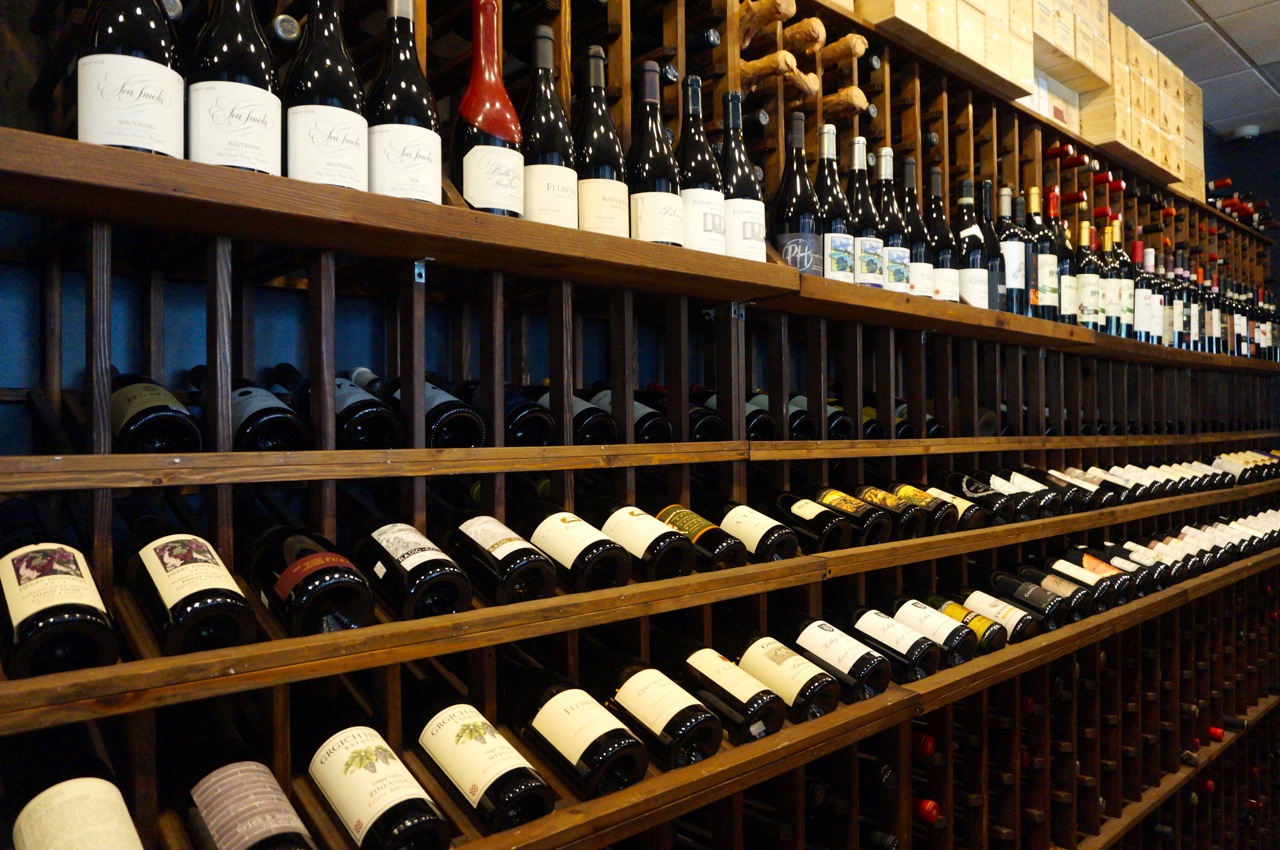Package Stores in the Wine Fight for Their Lives

Audio By Carbonatix

Inside the temperature-controlled wine room at the Wise Old Dog in West Hartford. Photo credit: Ronni Newton (we-ha.com file photo)
Legislation would allow sales in grocery, big box stores.
By Christine Stuart, CTNewsJunkie.com
If it was any other year, package store owners would cram the atrium of the Legislative Office Building to oppose a bill that would allow grocery stores to sell wine. But their opposition this year will have to be virtual.
The public hearing on the bill began at 9:30 a.m. Thursday, and will be broadcast on CT-N.
Michael Andreo of Putnam Plaza Super Liquors in East Hartford says the legislation would be devastating to his business, which has been in his family since 1970.
“It’s like playing a basketball game and someone changes the rules in the middle of the game,” Andreo said Tuesday in a phone interview. He says it would cut down on the variety and hurt distribution, too, because the sales would go to big wineries and the small Connecticut wineries would be unable to compete.
Andreo says he’s worried.
“You have to fight these battles otherwise they will take your livelihood away from you,” Andreo said.
But Wayne Pesce, president of the Connecticut Food Association, which represents the grocers says that’s not the case.
Pesce says from 2009-2012, in 22 of the 34 states and the District of Columbia that allowed grocers to sell wine, the number of package stores increased. In one state the number stayed stable. He plans to testify that in 12 states, the number of package stores declined, but in most of those cases the number of food stores also declined, indicating broader economic factors other than competition for wine sales were likely involved.
Pesce says the package store owners didn’t suffer the way they claimed they would after the state allowed Sunday liquor sales back in 2012, and they won’t suffer if the state makes this change.
Pesce says the state could figure out a way to compensate package stores that might be adversely impacted.
Some of compromises in other states, according to Pesce, included protected geographic zones around existing smaller stores, and allowed existing license holders to expand their product offerings or obtain multiple licenses to grow their businesses.
What if a consumer has a question about a bottle of wine?
“There would be no one there to service them,” Andreo said.
He said they don’t have the expertise in a grocery store to recommend a bottle of wine.
Click above to vote on HB 6101: AN ACT CONCERNING VARIOUS ISSUES RELATED TO THE LIQUOR CONTROL ACT
Pesce says that his members would partner with Connecticut wine growers and raise awareness of Connecticut wines. He said if Connecticut wine came to represent just 1% of total projected food store wine sales, or 10,805 gallons, it would represent a 27.6% increase in sales by local wineries, generating new jobs in wine and vineyards.
Isaac Reyes, vice president of government affairs for Target, says that 46 other states, including nearby New York and Massachusetts, allow Target to sell alcoholic beverages.
“Connecticut is an outlier in this situation,” Reyes said in his written testimony.
Reyes says that “our guests want the convenience and affordability of being able to buy adult beverages while on their Target run.” And with the pandemic it’s important to consolidate trips to the store.
“If we are also able to offer a selection of great Connecticut craft beer and other beloved favorite brands, our research tells us that our guests will make these purchases,” Reyes said in his written testimony. “This won’t preclude them from also patronizing their neighborhood package store. It simply provides the existing Target guest with another convenient option.”
Package store owners say it’s not fair because they can only sell beer, wine and liquor while the big retailers and grocers sell thousands of other products.
There are over 1,200 package stores in Connecticut.
Lawrence Cafero, executive director of the Wine and Spirit Wholesalers of Connecticut, says more wine isn’t going to be consumed as a result of this legislation.
“It’s the same amount of wine sold at a different place,” Cafero said in his written testimony. “This means no increased revenue to the state – only extra profit to the supermarket chains at the expense of family-owned package stores.”
Republished with permission from CTNewsJunkie.com, all rights reserved.
Like what you see here? Click here to subscribe to We-Ha’s newsletter so you’ll always be in the know about what’s happening in West Hartford! Click the blue button below to become a supporter of We-Ha.com and our efforts to continue producing quality journalism.



